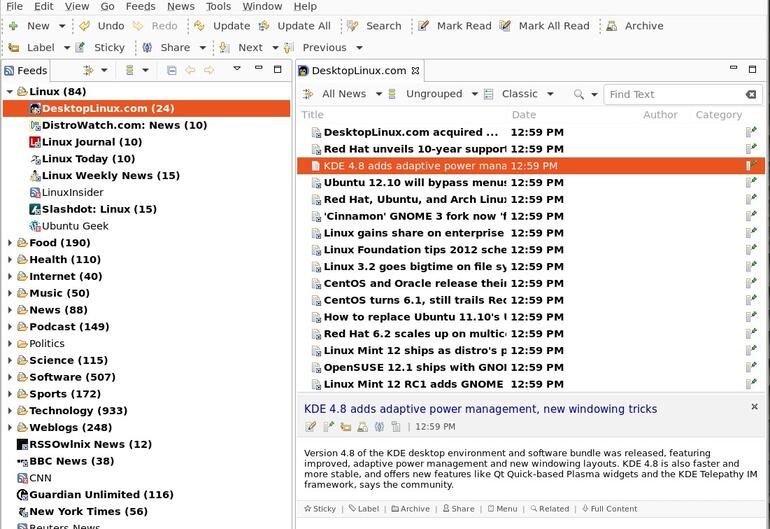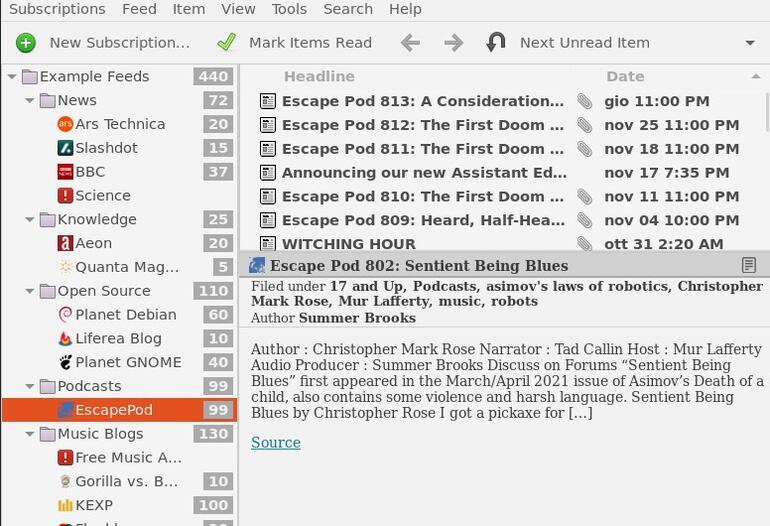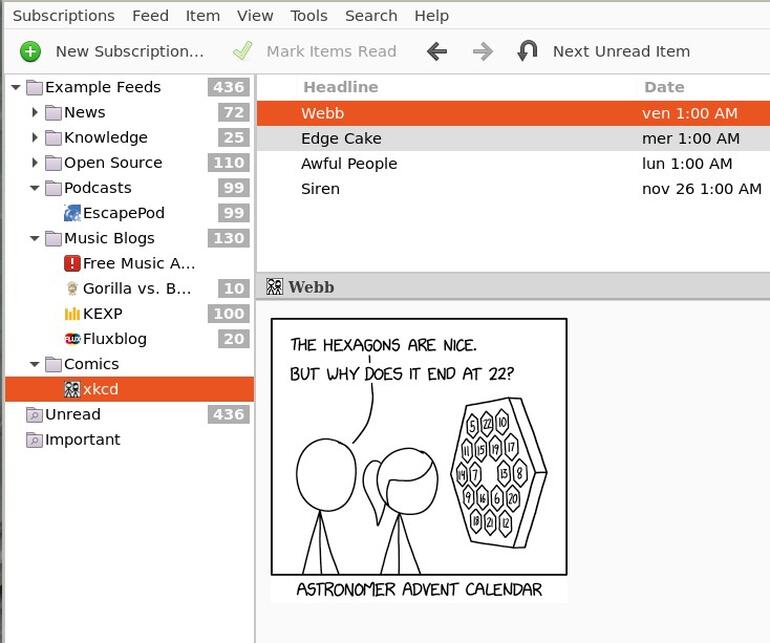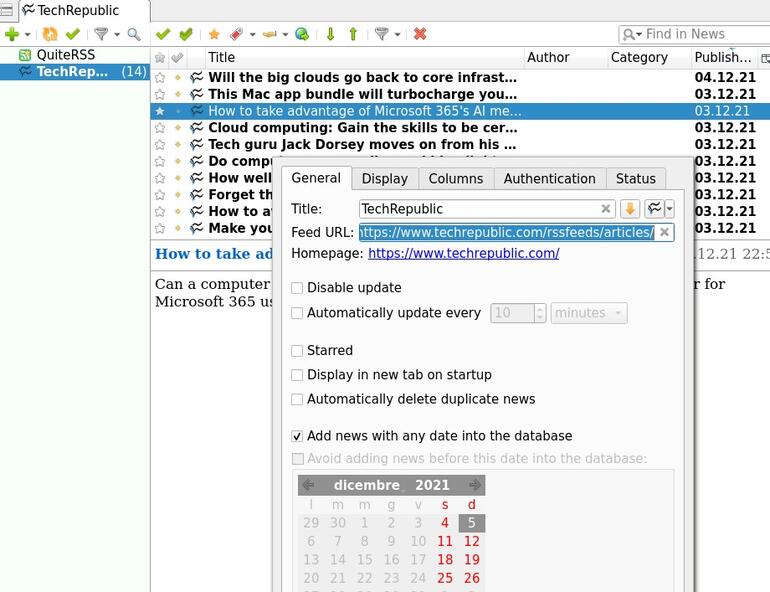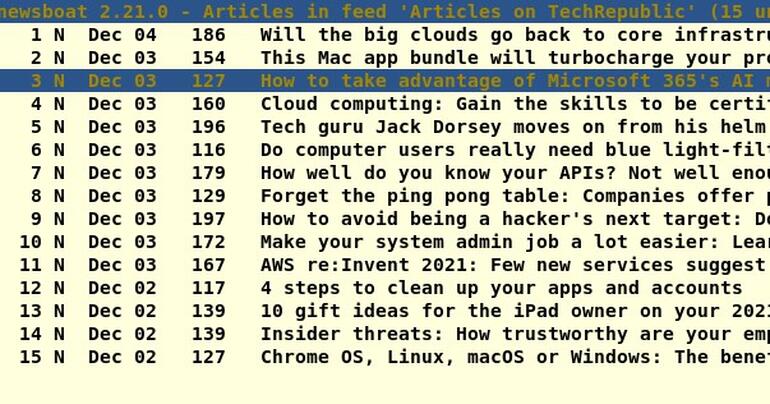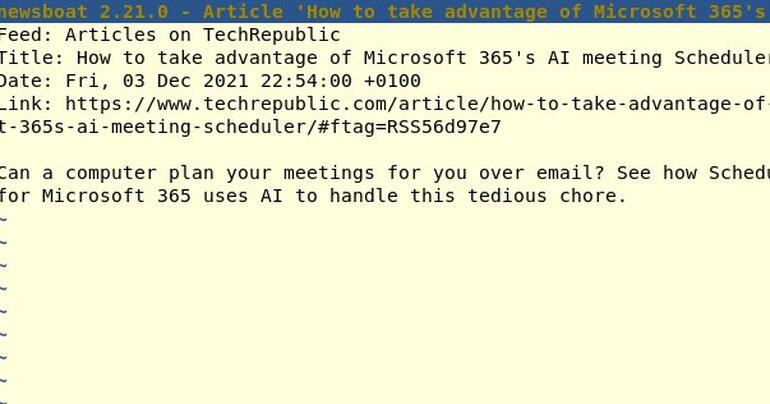RSS readers are a way to get all the online news you want without distractions, flame wars or annoying advertising. Here are four RSS feeders you can use on your Linux-based machine.

Image: iStockphoto.com/nicomenijes
Standards like RSS are maybe the most underrated and underutilized feature of the modern web. RSS feeds are plain text files that every website publishes at a fixed address, with an explicit link or the common RSS icon. Those feeds are continuously rewritten with headlines, excerpts and links to the full versions of all the latest additions to that website. Then, using programs called RSS readers, or aggregators, you can automatically download and read as many RSS feeds you want, whenever you want, in one window. It’s hard to overstate how great this is, because:
- RSS saves time. Lots of time. There is little more efficient than one single “entry point,” usable even offline, for all sorts of news, from major events to friends’ blog postings and … nothing else.
- RSS feeds are unfiltered. No algorithms there. Unlike what happens inside social media, with RSS you are always sure to download all the news, and you’re always free to ignore or prioritize them as you wish. With RSS, the only filter is your own conscious selection of news sources, so choose responsibly!
- RSS is not centrally monitored. All your data stays with you. Behavior tracking remains inside your own computer, if it happens at all.
Basically, the only thing wrong with RSS today may be that too many websites hide this option from their readers. Let’s see how to use this wonderful standard with my favorite RSS readers for Linux.
SEE: Feature comparison: Time tracking software and systems (TechRepublic Premium)
4 great RSS readers for Linux users
The main purpose of this article is to inspire readers to try the efficiency and privacy of the RSS way; therefore, I deliberately present only four RSS programs with these characteristics: They are all stand-alone tools that do not require a web server or external databases to work; they all run on Linux and, in some cases, other operating systems; and (with one exception) they can all be installed quickly without problems, on any modern distribution. Here are four RSS readers (in more or less random order) that Linux users should check out.
1. RSSOwlnix
Behind a really strange name, RSSOwlnix (Figure A) has a lot of qualities. To begin with, it handles without problem all main syndication formats, not just the original RSS. It has a good search function that you can make even more powerful by diligently applying your own labels to news. Even better, RSSOwlnix can remember searches and present them as if they were customized RSS feeds.
Figure A
” data-credit>
RSSOwlnix has a great default selection of RSS feeds.
This tool can also automatically highlight headlines containing predefined keywords and save important articles in its own archive. RSSOwlnix has a great, semi-automatic RSS feed importer, and may have the best online documentation of the pack besides a built-in tutorial accessible by pressing the F1 key.
2. Liferea
Liferea (Figure B) is probably the quickest aggregator to try, as it seems to be the one that’s installable straight from standard repositories and package managers of most major distributions. While I have never had opportunity to test this particular feature, its authors declare that Liferea can extract headlines even from HTML5 websites without actual feeds. In any case, Liferea can download full articles besides their excerpts and even play podcasts (because yes, RSS isn’t limited to syndicated text) or show comics, as in Figure C.
Figure B
” data-credit>
Besides texts, Liferea can aggregate links to podcasts.
Figure C
” data-credit>
RSS in Liferea is a great way to get your daily dose of web comics.
A particularly important feature of Liferea, which may be enough to choose it for some users, is its capability to log into web-based, multi-user RSS aggregators like TinyTinyRSS or TheOldReader. By combining Liferea with accounts on those services, you may build your very own custom stream of news that is accessible from any computer and easily archived on your own desktop.
SEE: 40+ open source and Linux terms you need to know (TechRepublic Premium)
3. QuiteRSS
QuiteRSS (Figure D) may be the favorite RSS aggregator for users who like to tweak any conceivable aspect of their software interfaces. You can use its full-screen mode, hide the list of feeds to have even more space and open each excerpt, or the corresponding full article, in a separate tab. At the same time, you may confine QuiteRSS to the system tray to just show in every moment the number of new or unread items. Besides tuning the look and feel of QuiteRSS in many other ways, its users can disable images, JavaScript and ads in the feeds, to read them even faster. Another valid reason to try QuiteRSS may be support for quickly sharing news via Telegram.
Figure D
” data-credit>
QuiteRSS has so many useful configuration options that it is easy to get lost among them.
4. Newsboat
No matter how short, no roundup of applications for Linux desktops would be complete without at least one terminal-based program. With RSS aggregators, the choice, at least for me, is easy: Newsboat (Figures E and F), which also runs on FreeBSD, macOS and likely, if you feel like compiling it from sources, on any other Unix flavor around.
Like Liferea, Newsboat can play podcasts, categorize your feeds and label single news as you wish, and filter out any article about uninteresting topics.
Figure E
” data-credit>
In Newsboat, you get news announcements and nothing else. No distraction is possible.
Figure F
” data-credit>
Newsboat is as spartan as it is powerful.
As Figures E and F show, it would be impossible to get distracted by anything while using Newsboat. Its true power is the ability to configure keyboard shortcuts to browse headlines faster or execute your own macros to go even faster. If that’s not enough, there is a query language to set meta feeds, feed pre-processing capabilities and, as with Liferea, integration with online RSS aggregators.
Try these RSS aggregators, and let us know in the article comments how it goes.
Also see
Source of Article
